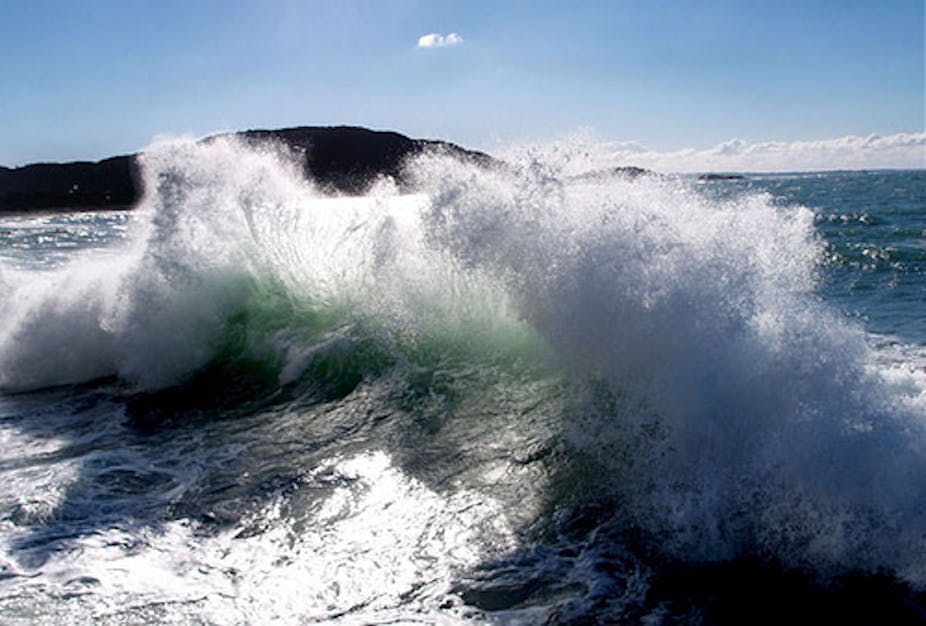On an island in the middle of the Atlantic Ocean I crouch by a seawall.
The weather, normally so clement at this time of year, is appalling. Over the previous three days, the wind has blow-up thirty-foot waves and the rain has soaked the high cliffs that tower above the village here. Sodden and heavy, loose chunks of rock have begun to break free, toppling hundreds of feet.
I say chunks; they’re the size of houses. The locals, me and a few tourists staying here now shelter as close to the beach as we dare, hoping the earth won’t fall down and cover us as happened centuries previously.
What in heaven’s name am I doing here? I’m a market researcher at the University of Melbourne and my work investigates how businesses and consumers converse with the natural world.
Once-upon-a-time, nature was there for the taking, something to be exploited. To some extent, it still is. Schools of fish supply the trawler industry; coal and uranium lie dormant for us to dig. The wind and the sun offer energy, and (Baillieu government permitting) the sea will quench the thirst of parched suburbs.
I say once-upon-a-time though, because recent events on this small island illustrate how nature bites back. Notwithstanding abstract fears over global warming or climate change, the forces of earthquakes, tsunamis, hurricanes and bush-fires have made themselves all too apparent over the past few years.
The implications for businesses are grave: coal stocks took a beating following the Queensland floods; the banana industry remains dazed after a king-hit from cyclone Yasi; and who knows how far the economic consequences from Japan’s recent misfortune will extend?
Despite these obvious connections, how do business people think about nature? Business schools normally limit educational discussions to sustainability, the benefits of ‘green branding’, and the necessity for industries to steel themselves in preparation for carbon taxes. Within business research, nature is often an ‘externality’ - out there, real, but excluded from the theory and practice of commerce.
This view is sustained by the apparent indifference of nature to economic intentions. Rivers, winds and rain are objects, spaces and forces that care nothing for trade and industry.
With a little reflection, however, it becomes difficult to sustain this view of nature. First, history shows that nature has been understood and assigned changing cultural meanings and uses in different societies.
These cultural factors have affected physical landscapes, as exemplified by the centuries of agricultural practices that formed the English ‘countryside’, or the political processes that generated Australia’s national parks. In short what constitutes nature is assuredly cultural.
With this in mind, and with the desire to account for how nature fits into the networks and practices that constitute local and global business interests, my research tracks and investigates the diverse clusters of people and things that constitute nature.
Interviews with those who are close to nature are my stock in trade, but I don’t limit the investigation to people. Who says you can’t interview animals, oceans, rivers and forests? I take my lead here from anthropological and medical research that uses poetry, theatre and visual arts to understand and explain the intense experiences of anxiety, mental illness and pain, for which everyday language so often fails.
Guided by these methods, the past years have seen me attempting to bring diverse understandings of nature together.
By following all kinds of leads - like an investigative journalist – I am beginning to construct a perspective that sees nature as resulting from the actions and intentions of actors as diverse as consumers, politicians, novelists, historians, poets, surfers, advertisers, and business people.
Mixing these accounts with the voices of animals and plants, rivers and winds, for example, I find that what we think of as ‘nature’ is unpredictable and contested, assembled not only from geographic features and forces that are beyond our control, but with technical equipment, brands, the law, science, political promises, and perhaps most importantly, popular stories and national myths.
Of course, no amount of story telling can free us from the real consequences of physical events in nature. Under this cliff, it’s all too clear what risks the villagers here experience, what anxiety our farmers in Queensland must be living through, and what grief lies behind and ahead for the people of Japan.
Nevertheless, the practical use of understanding nature through a diverse variety of voices and perspectives can help to bring the context to life for policy makers and NGOs.
The worlds’ leading advertisers breath life into products by Coca-cola, Citroen and Castrol by giving them voices, faces and personalities with which consumers can experience conversations and relationships.
Replicating these powerful approaches can guide and prepare business leaders of the future to converse intelligently with forces and features of the natural world, and to bring nature to life in the minds of the public whose consumption practices will affect and be affected by our relationships with nature over the coming decades.
Doing so however will require more than dry, rationalised responses such as carbon taxes. On the contrary, we must engage with the full range of voices – rational, poetic and magical - that speak for nature.
For small business owners, this understanding of nature has benefits also. By leveraging the stories and fantasies people play-out in nature, rugged outdoor brands as well as service providers such as ski resorts, surf-camps, mountain guides, and camping parks can gain competitive advantage in the so called ‘experience economy’.
Beyond equipment, infrastructures and geographic locations, the best of these businesses frame experiences of nature with roles and myths that consumers want to act-out.
A simple horseback ride in the bush or the chance to be Ned Kelly for the afternoon? I know which I’d prefer. Perhaps that’s why I’m motivated to build research in this way; there’s got to be more to it than lab-work, focus groups and questionnaires… If only it would stop raining.

